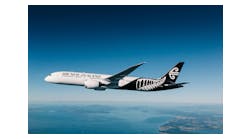London, December 4, 2012 – British Airways Engineering, a leading Maintenance, Repair & Overhaul (MRO) provider, announces it is able to provide TCAS system upgrades to its customer airlines and has developed its own Part 21J major change to enable it to upgrade from TCAS 7.0 to TCAS 7.1. As part of its customer operations, British Airways Engineering is now able to carry out warranty repair capabilities for components supplied by ACSS, a leading provider of commercial avionics, via British Airways Engineering’s ACSS-approved European repair centre.
British Airways Engineering, through its commercial operations, has capacity to provide immediate TCAS upgrade service to operators or inventory houses looking to upgrade their equipment to the EASA-mandated standards. As the only ACSS-approved repair shop in Europe, moreover, British Airways Engineering can help European customers cut costs on complying with Change 7.1 by removing the need for them to send their aircraft or components to repair shops based outside of Europe.
Brian Currie, general manager at British Airways Engineering, commented: “The TCAS 7.1 standard upgrade is an important development for the aviation industry and the continued safety of the millions of passengers carried each year. As well as being able to support these industry wide modifications, we also employ new diagnostics and reliable technologies and our staff support a culture of continuous improvement to enhance future aircraft capabilities.”
Michael Tremose, Director of Customer Support at ACSS commented: “We have a long-standing working relationship with British Airways Engineering and are happy to entrust the MRO with the important task of ensuring our customers’ TCAS II systems are ready for Change 7.1. By contracting these updates to British Airways Engineering, airlines will be able to carry out the changes at a much lower cost than with unauthorised suppliers, and rest assured that they will be carried out to the highest of standards.”
All avionic work is supported by British Airways Engineering’s Federal Aviation Administration, Transport Canada Civil Aviation and European Aviation Safety Agency part 145 approved 142,000 sq. ft. avionic component maintenance facility, which is located in South Wales. The purpose-built facility’s highly skilled workforce has a broad range of capabilities including electrical, electronic and mechanical components.
The Change 7.1 standards, which come into force in 2015, will act as a safety enhancement for TCAS II systems, used to ensure aircraft maintain a safe distance when in flight. At present, British Airways Engineering can provide Change 7.1 upgrades on the following ACSS components:
TCAS II Computers 4066010-910
TCAS 2000 Computers 7517900-xxxxx
TCAS 3000 Computers 9003000-xxxxx
ADTL Transponder 7517800-xxxxx
VSI indicator 4067241-8xx
Future capabilities will include:
TCAS 3000SP 9003000-xxxxx
T2CAS 9000000-xxxxx
About British Airways Engineering
British Airways Engineering has over 80 years’ experience of providing maintenance, repair and overhaul services to British Airways and global airlines. The company has invested in state-of-the-art aircraft maintenance, avionic, interiors and mechanical workshop facilities and has a worldwide reputation for engineering excellence. In addition to experience gained on all major Boeing and Airbus models, British Airways Engineering has developed capabilities for the B787 and Airbus 380 aircraft types.




